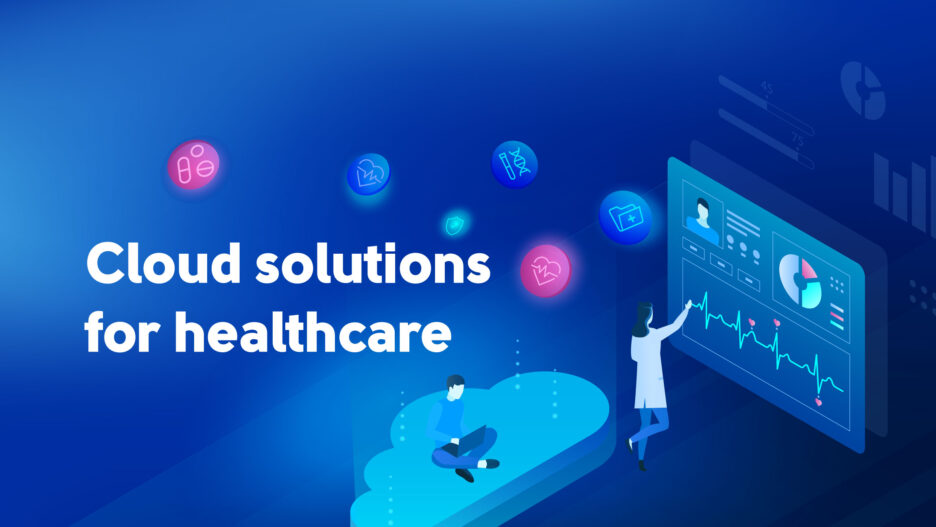Traditional healthcare is under increasing pressure to be transformed into a digitally connected care environment. As a result, priority investments are being made in data and analytics infrastructure and cloud for healthcare technologies.
Investments in developing a data network that offers access to underlying data silos and enables high-level data analytics tools should be prioritized. This path requires a change to on-demand cloud delivery of new capabilities.
With the advent of cloud-based solutions, healthcare organizations can now harness the power of connected data (from electronic health record or EHRs and healthcare Customer Relationship Management or CRMs) to gain deeper insights and provide patients with more tailored digital experiences throughout their journey.
In this blog, we’re going to dig deeper into the world of cloud for healthcare or to what many now refer to as e-health cloud. With a special emphasis on the opportunities and challenges that e-health cloud offers, we will also list out some of the most prominent cloud in healthcare tools that are re-shaping the way we look at healthcare in a modern setting.
Let’s get rolling!
What is e-Health?
E-health is a buzzword these days, but no one has yet come up with a definitive definition for this relatively new concept. The term was first used in 1999, but it now appears to be a general "buzzword" that is used to describe nearly everything linked to computers and medicine.
For context, Intel actually referred to e-health as “a concerted effort undertaken by leaders in health care and hi-tech industries to fully harness the benefits available through convergence of the Internet and health care.”
This definition gives a broad overview of what e-health refers to, but we find a more granular definition in the National Library of Medicine, “e-health is an emerging field in the intersection of medical informatics, public health and business, referring to health services and information delivered or enhanced through the Internet and related technologies. In a broader sense, the term characterizes not only a technical development, but also a state-of-mind, a way of thinking, an attitude, and a commitment for networked, global thinking, to improve health care locally, regionally, and worldwide by using information and communication technology.”
As evidenced by these two definitions, e-health is so much more than just the convergence of medicine and the internet. Now, let’s define what e-health cloud is.
What is e-Health Cloud?
Access to medical records at any time and from any location has the potential to significantly enhance healthcare. Healthcare cloud computing can be utilized to gain access to patient records, hence enhancing the quality of care.
E-health cloud computing is a type of healthcare cloud computing that is used to improve patient care and alleviate some of the shortcomings of hospital information systems.
As healthcare cloud computing has grown in popularity, it has opened up a wide range of new opportunities for healthcare providers, particularly in the areas of data management such as the integration of data, ease of sharing, and cost savings, service delivery including software testing and debugging, cloud security healthcare like data confidentiality and integrity, and software development namely software convenience, cloud-based medical image exchange, and software scalability.
As such, it’s evident that e-health cloud computing platforms are transforming healthcare on cloud by offering consumers fresh protocols that were not possible even a decade ago. Innovative e-health cloud computing platforms will cement their place as a cornerstone of modern health-care systems.
Opportunities and Challenges of e-Health Cloud
The capacity to develop a virtual health care system benefits all industry stakeholders, from individual patients who want to follow their daily behaviors to government agencies working on national projects.
Here are some of the most noteworthy opportunities e-health cloud computing offers the industry as a whole.
Accurate insights. The amazing thing about healthcare cloud computing is its capacity to provide correct data to all stakeholders (doctors and patients alike) for proper decision-making.
Thinking one step ahead. Cloud computing advice and insights are sophisticated enough to detect potential hazards and threats before they occur.
Looking at the bigger picture. Healthcare cloud technology's data sources are diverse, allowing each healthcare system participant to gain the broadest perspective available.
Leveraging Big Data. Analytics in the cloud computing era works with massive data volumes, including active and scalable environments.
Accurate decision-making. The collecting and processing capabilities of cloud computing analytics can considerably minimize the number of medical errors.
Cost-effectiveness. The cloud is inexpensive compared to the huge number of analytical possibilities that are made available automatically.
Superior flexibility. Since its inception, cloud computing in healthcare has demonstrated its capacity to quickly and correctly adapt to the industry's needs.
Increased transparency. Patients and doctors can now openly share health information thanks to cloud computing.
Aside from the multiple benefits of cloud computing in healthcare, the technology serves a larger purpose: to construct a smart healthcare community, a network that enables tailored treatments. It's a big stride forward for the industry in addressing lifestyle-related noncommunicable diseases.
In contrast, some of the most serious challenges in cloud computing healthcare are related to security and remote access. Here are some of the challenges faced when implementing e-health cloud computing solutions:
The scarcity of qualified specialists. One of the most significant issues of cloud computing in healthcare is the inability to find a software partner that works with this modern technology.
Functionality is limited. Cloud computing is insufficient on its own. Smart linked devices, artificial intelligence, and master data management will also be required to develop an effective analytics architecture.
Security concerns. Healthcare practitioners who use cloud computing may face some privacy issues. However, this problem emerges when referring to unprofessional software vendors.
Next, we’re going to delve into the different healthcare cloud computing tools and apps available to make healthcare decisions with accuracy, powerful insights, and with patient well-being at heart.
Healthcare cloud computing
Apple HealthKit
The Health app was designed to help you keep track of all of vital health information in a single, safe location. Apple is giving users even more power with iOS 15's new features. To better understand your health status, you may use trend analysis and new ways to share your data with loved ones. You can also use a new statistic to determine your walking steadiness and danger of tripping and falling.
The Health app puts crucial health information at the fingertips of users, including sleep, activity, and other indicators. It also collects data from your devices including your iPhone, the built-in sensors of your Apple Watch, compatible medical devices, and apps that leverage HealthKit.
AWS for e-Health
Because of its unsurpassed dependability, security, and data privacy, AWS as the Amazon healthcare cloud is the go-to technology and innovation partner for the worldwide healthcare and life sciences industry. Some of the ways AWS empowers healthcare and life sciences include:
- Learn how to save costs, improve operational and clinical efficiency, and ultimately improve patient care with purpose-built solutions for healthcare and life science enterprises of any size.
- AWS Marketplace, a curated digital library of third-party software, services, and data, makes it simple to get started on AWS with an extended network of industry-leading AWS Partners.
- Work with a team of healthcare and life sciences experts who can support your digital transformation and innovation activities. The average tenure of AWS health executives is 18 years.
- With more than 130 HIPAA-eligible services at your disposal, you may improve your security posture while also streamlining compliance. With AWS, you'll have access to the world's largest and most reliable global cloud infrastructure.
Dell Healthcare Cloud Computing Solutions
Dell healthcare cloud technologies make it a leader in the healthcare sector. The tech giant serves the top 10 healthcare companies in the world with its Dell EMC PowerMax/VMAX product. Over 65% of storage infrastructure in US hospitals runs on Dell EMC and over 8K hospitals worldwide deploy Dell EMC healthcare solutions.
Dell EMC solutions applies artificial intelligence and machine learning to data sets to speed data analysis and subsequent decision-making. Some of the key industry applications of Dell solutions for the healthcare space include:
- Electronic Health Records or EHR cloud
- Medical Imaging
- Emerging Workloads
- Life Sciences
- Digital Pathology
- Next-Generation Sequencing
European Health Data Cloud
EBRAINS services for sensitive data are the goal of HealthDataCloud. As part of the collaboration, they have a mix of long-standing Human Brain Project (HBP)/EBRAINS infrastructure partners and recent HBP members. Charité University Medicine Berlin, Europe's largest university hospital, serves as the consortium's coordinator.
It is Charité's existing GDPR-compliant and EBRAINS interoperable Virtual Research Environment (VRE) that is the foundation for the EBRAINS HealthDataCloud, providing a safe and scalable data platform for multi-institutional research teams to store, share, and analyze complex, multi-modal health datasets.
There is a central node at EBRAINS RI, as well as a network of satellite nodes at hospitals, research institutes, and computer centers, that make up the EBRAINS HealthDataCloud.
Google Health
With an emphasis on consumers, caregivers, communities, and researchers, Google Health is dedicated to making health information accessible and meaningful to everyone, regardless of where they live. As a company, the goal is to provide people with the tools they need to take charge of their own well-being.
Care teams will be better equipped to communicate with one another as a result of the technology we're working on developing. Furthermore, Google Health is looking into how artificial intelligence can help in the diagnosis of cancer, the prevention of blindness, and a host of other applications.
Some of the most important apps and products Google Health offers to include:
Google Health works with world-class clinical, public health, and academic groups to implement breakthrough technology. They do research and develop innovative healthcare solutions for individuals, caregivers, and health professionals by combining partners' knowledge and experience, Google's technological skills, and patient insights.
Microsoft eHealth Information Management
Healthcare cloud Microsoft provides tools and applications that focus on providing the right health information at the right time and to the right people, ensuring compliance, confidentiality, integrity, and data accessibility. Their goals? Personalized care, patient engagement, health team collaboration, improved health data insights, care teams’ empowerment, operational outcomes’ improvement, reimagining healthcare, and protecting health information.
Microsoft Cloud for Healthcare enables healthcare companies to better serve their patients, coordinate treatment, and increase operational efficiencies, all while helping to ensure the security, compliance, and interoperability of health data from end to end. Microsoft Cloud for Healthcare.
Phillips HealthSuite Digital Platform
Philips aims to improve the health and sustainability of the world via innovation. Innovative health, wellness, and life science solutions are being developed on their HealthSuite digital platform, which encourages open and collaborative innovation.
The Digital Platform for Philips healthcare cloud HealthSuite (HSDP) offers the means to:
- Connect your devices and your computer to the internet
- Collect data from both patients and the general public
- Securely store and distribute information
- Create and deploy cloud-based solutions for analysis
- Develop methods for putting data to use
Clinical decision-making can be made more quickly and efficiently with the help of HSDP. Building on HSDP allows doctors to collaborate closely with their patients and provide recommendations for the best suitable therapy.
Pfizer and AWS medical development
Pfizer and Amazon Web Services (AWS) have teamed together to explore cloud-based solutions to speed up the development, manufacturing, and distribution of novel medications for use in clinical studies.
The pair will look at how AWS's capabilities in analytics and machine learning, as well as computational power, storage and security may be applied to Pfizer's clinical production and supply chain operations in Pfizer laboratories.
Pfizer perfectly illustrates how it’s managing cloud computing platforms in order to better communicate and collaborate with all of the industry players. Xalkori, a lung cancer medicine designed specifically for patients with an ALK gene mutation, was used in an experiment to great success. The appearance of this remedy would not have been conceivable without cloud computing's preceding analysis. In addition, the project was completed in under three years, including the time required for FDA approval.
Salesforce Health Cloud
Numerous healthcare organizations have been given the ability to turn obstacles into opportunities thanks to Salesforce Health Cloud, which was first introduced in 2016 in response to industry demands.
Cloud-based Health Cloud integrates CRM capabilities with industry best practices to create a single platform that can be used by both healthcare and life sciences enterprises to manage their day-to-day operations and operations management. It allows companies to move from a medical record-focused to a patient-centric strategy by providing a comprehensive perspective of patients on a unified platform.
SAP Healthcare Cloud
SAP's healthcare cloud goal is to help healthcare providers save lives, create a smooth patient experience, and ensure value-based care with cutting-edge technology.
SAP is dedicated to assisting healthcare businesses in delivering services that are both cost-effective and patient-centered. Automation, data-driven decisions, and employee empowerment are all being improved by their solutions.
Their key offerings in healthcare include:
- Patient application portal on the internet in the cloud
- Prediction of emergency room and outpatient treatment wait times
- Artificial intelligence to automate patient billing in the first edition of the patient accounting solution
- Enhancement of different data sources administration and monitoring
- Calendar and clock in the form of an image
- Expanded self-service options for patients
- A cloud-based patient administration and healthcare data system in its initial iteration (partner solution)
- Using a secure, patient-centered health cloud, digitize central healthcare data.
Siemens Healthcare Cloud teamplay Platform
The teamplay Cloud Platform enables data to be gathered and processed in a safe environment via a single web address (URL). Teamplay is a cloud-based platform for healthcare that was launched in 2015 and already has more than 4,000 connections in 60 countries.
Snowflake Healthcare Cloud
It is now possible for healthcare and life sciences companies to move quickly while delivering the greatest outcomes for patients with the help of the Healthcare & Life Sciences Data Cloud.
It is possible for healthcare and life sciences enterprises to focus on medical innovation and providing great health results while maintaining tight levels of data security, governance, and compliance thanks to Snowflake's robust core platform capabilities, You may take full advantage of borderless data access by leveraging Snowflake's growing, linked network and moving forward with solutions provided by Snowflake and its partners.
Verizon Healthcare Cloud mHealth and Healthcare Enabled Services - HIPAA Cloud
The amount of data generated by mHealth products and services can be substantial, and mHealth providers must be able to efficiently handle this data if they are to provide patients with truly effective solutions. In terms of healthcare-enabled services, the HIPAA cloud from Verizon provides such a solution for both established and startup mHealth providers from an infrastructure-as-a-service perspective.
Conclusion
Due to the newness of the technology, it's critical to choose a software developer partner who is adept at both traditional and experimental techniques. Svitla Systems is here to help you in your end-to-end e-health cloud computing projects.
By incorporating healthcare cloud computing capabilities into your projects, we provide healthcare providers with cutting-edge software solutions and techniques. Contact our Svitla representatives if you'd like to learn more about our services and how we can help you with your project.





